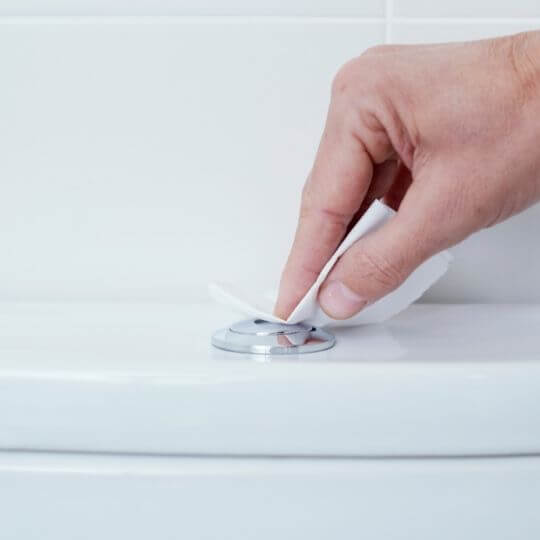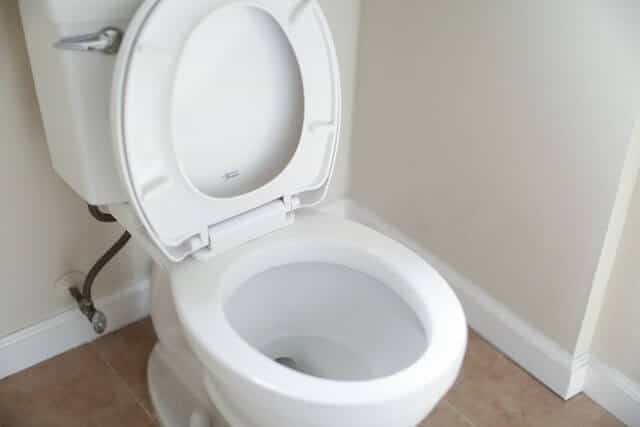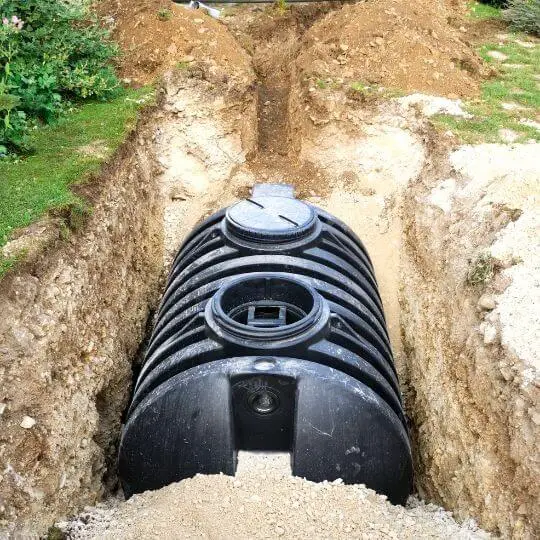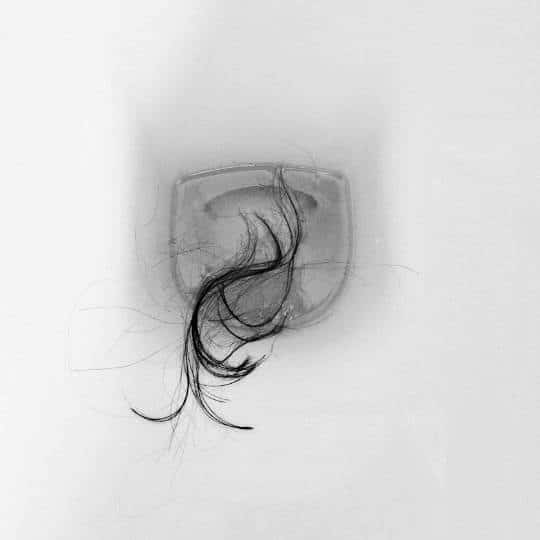Using the bathroom produces all kinds of waste, including tissues. At the same time, everyone is trying to make their housekeeping easier and spend less time on chores. This would be a reason to ask yourself: can you flush tissues?
Tissues are commonly produced after cleaning yourself in the bathroom and they need to be disposed of immediately. Whether you use them to blow your nose or remove makeup, once used, their place is in the bin.
However, there are situations when the bin is full or you are out of bin liners. Is it acceptable to flush tissues?
In this post we talk about what can happen if you flush tissues and how to dispose of them adequately.
What can you flush down the toilet?

Every plumber will tell you all you can safely flush down the toilet are human waste and toilet paper. Both items dissolve into water and can be carried away in sewer lines without incidents.
In practice, things can be a little different.
You may accidentally flush a tissue or you may be using flushable wipes.
So, can you flush tissues?
According to the manufacturer, such wipes supposedly dissolve in water, but you cannot know that for sure. Even if the wipes are advertised as flushable, the producer recommends flushing a limited number of wipes. Moreover, you need to be sure your sewage is in good working condition.
Truth is no plumbing professional will tell you to flush anything but pee, poo, and toilet paper. Even with flushable wipes, there’s a risk that the drain will clog.
So, to stay on the safe side, follow the expert’s advice and use a bin for waste other than toilet paper.
What happens if you flush tissues down the toilet?

Flushing one tissue down the toilet may not have any negative consequences. However, making a habit out of it can lead to serious problem.
The issue with tissues is that they don’t dissolve into water immediately. Even if they are made from biodegradable cellulose, they are often added an additive. The binder makes them stronger so they cope with the task we give them and not break due to friction. It’s this binder that delays the break down process and poses a risk to sewage systems.
Let’s imagine you flush a tissue. It can get carried away or it can get caught in a pipe burr or imperfection. When other items pass by, they will adhere to that tissue and a clog starts to form.
A tissue you have flushed can combine with solidified grease and dental floss from a neighbor. The next thing you know is that you have a plumbing problem.
If the clog gets severe enough, sewage will back up to your house. In the worst-case scenario, you will no longer be able to flush the toilet.
And there is also the effect of flushing unsuitable items on the public sewage system.
It has long been known that non-flushable items cause problems in sewer systems. [1] In various states across the country sewage treatment facilities have been dealing with non-flushable materials clogging filters and equipment.
This problem costing wastewater facilities millions of dollars in repairs has become worse since the beginning of the Covid-19 pandemic. People have been using more and more single-use hygiene products and not disposing of them correctly clogs pipes.
A negative effect of this situation is sewage overflow. This phenomenon can have adverse effects on the environment, if waste water enters local lakes and rivers.
Throwing unflushable items to the toilet increases repair expenses and also poses a risk to human health. All these issues are preventable by simply throwing waste in the bin.
Can you flush tissues with a septic tank toilet?

What if you are not connected to a public sewage system and use a septic tank instead? Does this mean that you can flush tissues?
You are not causing harm to wastewater facilities, right?
No, but you will be causing lots of trouble to yourself.
Using a septic tank means you need to be extra careful with what you can flush down the toilet. [2]
Septic systems are great for homeowners in areas without a municipal sewer system. They provide a safe way to process waste.
Many people know they cannot flush stuff such as wipes and dental floss in a septic system. But when it comes to cellulose products like tissues, people think these can go down the drain.
Truth is paper products, even those that claim to be flushable, are a peril to your septic tank. They can cause clogs in your pipes and baffles inside the septic tank.
And there is another good reason to only flush human waste. Considering that the volume of a septic tank is limited, you don’t want to fill it with paper. Some homeowners using septic tanks even prefer not to flush the toilet paper at all!
Toilet paper, even if it disintegrates in water, can sink to the bottom of your septic tank. There it contributes to the development of a sludge layer. As a result, you will have to pump your tank more often to keep that sludge layer within reasonable limits.
So, even if you can use toilet paper with a septic tank, choose toilet paper that breaks down rapidly. There is ‘septic safe’ labeled toilet paper that you can purchase. Avoid multi-layer or plush toilet paper, which takes more time to break down within your septic tank.
All things considered, can you flush tissues with a septic tank?
Obviously, not. Even with toilet paper you need to be careful when you are using a septic system. So, flushing tissues is out of question.
What other items should you not flush down the toilet?

Keep in mind the rule that only human waste and toilet paper go down the drain. This means nothing else should be flushed.
Even so, many people flush accidentally or intentionally all kinds of items, such as:
- Diapers
- Tampons
- Dental floss
- Q-tips
- Paper towels
- Facial tissues
- Baby wipes
- Rags
- Food
- Grease
- Medicines
- Kitty litter
- Hair
None of these items belongs to the sewer pipe. They can cause clogs, making it impossible to flush the toilet. Some products like litter and diapers contain highly absorbent fibers. These expand when coming in contact with water and cause blockages in your pipes.
When the situation is really bad, sewage water can back up to your house, which is a plumbing emergency. And the costs to have the problem solved can be very high.
What if you accidentally flushed a tissue?
But can you flush tissues accidentally? What can happen?
If you are lucky, nothing happens. But if the tissue adheres to a burr in a pipe and you also flush other unsuitable items, a clog can form.
If you have flushed a tissue by mistake, best is to retrieve it. Especially when you are using a septic tank.
Put on elbow-length rubber gloves and try to pull it out. If it’s not visible, look for it in the toilet’s trap.
If the tissue has already gone down the drain, there are still some methods you can use to retrieve it:
- Using a bent hanger to hook onto the wipe;
- Using plunger to create suction and move the tissue back into the toilet trap;
- Using a drain snake if the tissue is too far down the drain;
- Using a wet vacuum.
What to do with tissues instead of flushing them?
There are two ways of properly disposing of soiled tissues:
- Placing them in the green composting cart if they are biodegradable. Composting carts are emptied regularly on the scheduled collection day. [3]
- Putting tissues in the trash cart if it contains plastic. You need to bag and tie your trash to keep it contained. This helps protecting sanitation workers from contamination.
To make sure tissues end up where they belong, keep a trash bin in your bathroom. You can use it to dispose of all the other unflushable items, such as dental floss and wipes.
To Sum Up
The answer is no. Tissues break down slowly and can clog your drain pipe.
There are some circumstances when you can take a risk. For instance, you may flush flushable tissues in a limited number if the drain is 100% functional. But the best thing you can do is to put throw them in the bin.

Michael Davis is a heating & plumbing expert who currently works as independent contractor in SC. He also writes for Plumbertip.
For almost 10 years he worked on various plumbing tasks across South Carolina.


